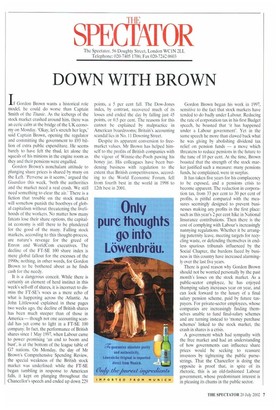DOWN WITH BROWN
If Gordon Brown wants a historical role model, he could do worse than Captain Smith of the Titanic. As the icebergs of the stock market crashed around him, there was an eerie calm at the bridge of the UK economy on Monday. 'Okay, let's stretch her legs,' said Captain Brown, opening the regulator and committing the government to £93 billion of extra public expenditure. He seems barely to have felt the thud, let alone the squeals of his minions in the engine room as they and their pensions were engulfed.
Gordon Brown's nonchalant attitude to plunging share prices is shared by many on the Left. 'Perverse as it seems,' argued the Guardian this week, 'both the authorities and the market need a real crash. We still need something to clear the air.' There is a fiction that trouble on the stock market will somehow punish the bootboys of global capitalism without threatening the livelihoods of the workers, No matter how many fatcats lose their share options, the capitalist economy is still there to be plundered for the good of the many. Falling stock markets, according to this thought-process, are nature's revenge for the greed of Enron and WorldCom executives. The decline of the FT-SE 100 share index is mere global fallout for the excesses of the 1990s; nothing, in other words, for Gordon Brown to be bothered about as he finds cash for the needy.
It is a dangerous conceit. While there is certainly an element of herd instinct in this week's sell-off of shares, it is incorrect to dismiss the FT-SE's woes as a mere echo of what is happening across the Atlantic. As John Littlewood explained in these pages two weeks ago, the decline of British shares has been much steeper than of those in America — though not one accounting scandal has yet come to light in a FT-SE 100 company. In fact, the performance of British shares since 1 May 1997, when Labour came to power promising 'an end to boom and bust', is at the bottom of the league table of G7 nations. On Monday, the day of Mr Brown's Comprehensive Spending Review, the special weakness of the British stock market was underlined: while the FT-SE began tumbling in response to American falls, it kept on plunging throughout the Chancellor's speech and ended up down 229 points, a 5 per cent fall. The Dow-Jones index, by contrast, recovered much of its losses and ended the day by falling just 45 points, or 0.5 per cent. The reasons for this cannot be explained by malpractice in American boardrooms; Britain's accounting scandal lies in No. 11 Downing Street.
Despite its apparent conversion to freemarket values, Mr Brown has helped himself to the profits of British companies with the vigour of Winnie-the-Pooh pawing his honey jar. His colleagues have been burdening business with regulation to the extent that British competitiveness, according to the World Economic Forum, fell from fourth best in the world in 1998 to 12th best in 2001. Gordon Brown began his work in 1997, sensitive to the fact that stock markets have tended to do badly under Labour. Reducing the rate of corporation tax in his first Budget speech, he boasted that 'it has happened under a Labour government'. Yet in the same speech he more than clawed back what he was giving by abolishing dividend tax relief on pension funds — a move which threatens to reduce pensions in the future to the tune of 10 per cent. At the time, Brown boasted that the strength of the stock market justified such a measure: many pensions funds, he complained, were in surplus.
It has taken five years for his complacency to be exposed, and a pensions crisis to become apparent. The reduction in corporation tax, from 33 per cent to 30 per cent of profits, is pitiful compared with the measures seemingly designed to prevent businesses making any profits in the first place: such as this year's 2 per cent hike in National Insurance contributions. Then there is the cost of complying with Labour's increasingly nannying regulations. Whether it be arranging paternity leave, meeting targets for recycling waste, or defending themselves in endless spurious tribunals influenced by the Social Chapter, the burdens faced by business in this country have increased alarmingly over the last five years.
There is good reason why Gordon Brown should not be worried personally by the past month's losses on the stock market. As a public-sector employee, he has enjoyed thumping salary increases year on year, and can look forward to the luxury of a final salary pension scheme, paid by future taxpayers. For private-sector employees, whose companies are increasingly finding themselves unable to fund final-salary schemes and are turning instead to 'money purchase schemes' linked to the stock market, the crash in shares is a crisis.
A government which had sympathy with the free market and had an understanding of how governments can influence share prices would be seeking to reassure investors by tightening the public pursestrings. That the Chancellor is doing the opposite is proof that, in spite of its rhetoric, this is an old-fashioned Labour government, whose predominant interest is in pleasing its chums in the public sector.


























































 Previous page
Previous page